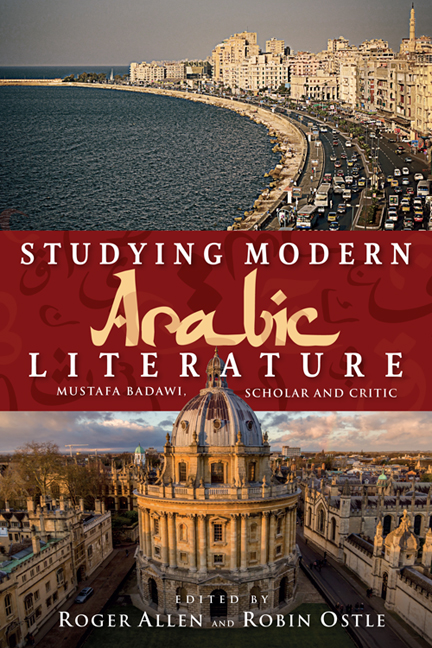Book contents
- Frontmatter
- Contents
- List of Figures
- Introduction
- Part I Alexandria to Oxford
- Part II The Academic Legacy
- 5 Beginning and End: Exploring the Qur'anic ‘Grand Story’
- 6 Modern Arabic Literature as Seen in the Late Nineteenth Century: Jurji Murqus's Contribution to Korsh and Kirpichnikov's Vseobshchaya Istoria Literatury
- 7 The ‘Second Journey’ (Al-Rihla al-thaniya) of Muhammad al-Muwaylihi's Hadith 'Isa Ibn Hisham Revisited
- 8 Ataturk Becomes 'Antar: Nationalist-vernacular Politics and Epic Heroism in 1920s Egypt
- 9 Jewish Arabs in the Israeli Asylum: A Literary Reflection
- 10 Strange Incidents from History: Youssef Rakha and his Sultan's Seal
- 11 Towards a Comparative Approach to Arabic Literature
- 12 Does Literature Matter? The Relationship between Literature and Politics in Revolutionary Egypt
- Notes on the Contributors
- Index
7 - The ‘Second Journey’ (Al-Rihla al-thaniya) of Muhammad al-Muwaylihi's Hadith 'Isa Ibn Hisham Revisited
from Part II - The Academic Legacy
Published online by Cambridge University Press: 05 August 2016
- Frontmatter
- Contents
- List of Figures
- Introduction
- Part I Alexandria to Oxford
- Part II The Academic Legacy
- 5 Beginning and End: Exploring the Qur'anic ‘Grand Story’
- 6 Modern Arabic Literature as Seen in the Late Nineteenth Century: Jurji Murqus's Contribution to Korsh and Kirpichnikov's Vseobshchaya Istoria Literatury
- 7 The ‘Second Journey’ (Al-Rihla al-thaniya) of Muhammad al-Muwaylihi's Hadith 'Isa Ibn Hisham Revisited
- 8 Ataturk Becomes 'Antar: Nationalist-vernacular Politics and Epic Heroism in 1920s Egypt
- 9 Jewish Arabs in the Israeli Asylum: A Literary Reflection
- 10 Strange Incidents from History: Youssef Rakha and his Sultan's Seal
- 11 Towards a Comparative Approach to Arabic Literature
- 12 Does Literature Matter? The Relationship between Literature and Politics in Revolutionary Egypt
- Notes on the Contributors
- Index
Summary
In the late 1980s, when Mo Badawi was contemplating his retirement, he wrote to me with the suggestion that I prepare my Oxford DPhil thesis of 1968, a translation and commentary on Muhammad al-Muwaylihi's famous narrative Hadith 'Isa ibn Hisham, for publication in book form. It duly appeared in 1992 as A Period of Time. Later in the 1990s another Egyptian scholar, Gaber Asfour, requested that I prepare for publication the complete works of both al-Muwaylihis, Muhammad the son (1858–1930) and Ibrahim the father (1843–1906). Those also appeared in Cairo in 2002 and 2007 respectively. All these projects took me back to a much earlier period in my career, indeed to its incipient phases when the impact of Mo Badawi's arrival in Oxford in 1963 was immense, in my own case and that of several generations of scholars aspiring to specialise in modern Arabic literature who followed. I had started reading Muhammad al-Muwaylihi's already renowned text for the ‘special paper’ on modern Arabic literature for finals. Such was my interest in the work – much stimulated by Mo's tutorials – that it was to become the focus of my postgraduate studies and eventual DPhil thesis. That process included a period of nine months in Cairo (1966–7), during the course of which a perusal of the entire run of the al-Muwaylihi newspaper, Misbah al-sharq, and of other newspapers of the 1890s and 1900s (in the Dar al-Kutub collection then housed in the Citadel) showed me that the subsequently published texts of both al-Muwaylihis, all of which had appeared initially in newspaper-article form, were in need of much further investigation, not only for their initial political and social context but also because of the often substantial changes that both writers made to the original texts before their republication in book form. Thus began a lengthy period of interest in the al-Muwaylihi family and its writings, a project to which I have occasionally returned in recent decades. And, in this tribute to the mentor who originally dispatched me along this path, I now come back full-circle, as it were, by discussing the second part of Hadith 'Isa ibn Hisham, the ‘second journey’ (Al-Rihla al-thaniya), which was included only in the fourth edition of the text (1927) after it had been selected as a school textbook by the Egyptian Ministry of Education.
- Type
- Chapter
- Information
- Studying Modern Arabic LiteratureMustafa Badawi, Scholar and Critic, pp. 102 - 117Publisher: Edinburgh University PressPrint publication year: 2015



